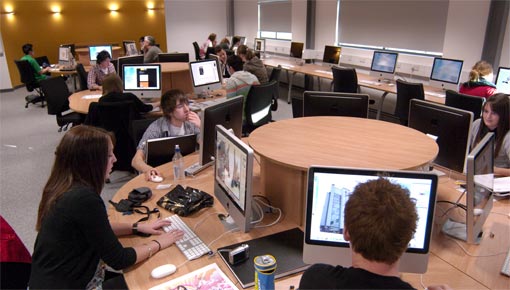
Was listening to CBC Radio this weekend and they were having a show discussing the relative merits of technology in the classroom.
One side posits that an over saturation of "new media" has occurred, with phones, music players, games, computers, email and social networking, so ubiquitous that learning has become nearly impossible to focus on. Notice I used little quotes around new media, since technically social networking is not a new media, but... it just might be the next evolution. As Mark Cuban succinctly put it in his infamous tweet; "the medium is no longer the message. the network is."
The other argument of course, is that all this technology is a boon to education. It is easier to learn with computers, and programs, and podcasts and ways to connect, interact, visualize, conceptualize and analyze. All the reasons we love technology in the first place. It makes life easer, and makes what might otherwise have been impossible, very simple.
The callers were of varying usefulness, particularly one girl who said she was 25 years old, and that when she was in high school she "barely had any computers," and "used overhead projectors mostly." Also, she claimed technology was making kids today dumber, according to her completely scientific opinion. Nevermind the fact that I am 26, and distinctly recall programming in a huge computer lab in high school that also included a Mac lab. Oh, and we had a graphing/CAD lab too, which naturally used computers. Slide rules can be so cumbersome, you see. But I digress.
One question that was not discussed however is the only one I have been mulling over still on and off for a few days. Undoubtedly, today's younger generation are tech savvy. But are they technologically literate? These might be defined as different things.
Sure, kids can put up myspace or blogger websites, but whatever happened to Free Hosting? With no GeoCities or Tripod like service, very few kids are forced to look at a blank page and learn to code in HTML, CSS or Flash in order to get their creation on the net. All the steps have been simplified to one-click, and thus they never have to learn the fundamental building blocks.
Isn't this the equivalent of reading to a child his whole life, but never actually teaching that child to read? Can someone be conversationally intelligent but illiterate? I don't see why not, and to a limited extent I almost feel like that's what's happening with a lot of students these days.
They understand the end product, but are sheltered from the process.
If anything, I think that's the real issue with technology in the classroom -- it's too dated. You can't be teaching stuff like "this is a mouse" to kids. There needs to be some sort of plan to actually advance them knowledge that won't be irrelevant within a year's time. Education not only needs to embrace technology, it needs to essentially become it's main driver if both are to achieve something continually useful for students of all ages.
Now I feel like I should register for some continuing education classes or something.
7 comments:
Education has always dealt with the problems around compromising limited time and resouces with quality. We learn much in school by rote memory, and only later learn the why - and then only if we are so inclined to seek it out.
Will I ever use a library card catalogue again? Is the Dewey decimal system still relevant if everything is available online?
True, fundamental building blocks are important - but only as much as they are able to facilitate an understanding of possibilities and current limitations. Anything beyond that should, in my mind, be trade specific education.
I am thrilled that today's youth is tech savvy, and not so concerned whether or not they are tech literate. Just as I am able to manipulate knowledge and data more efficiently than most of my Gen X co-workers, this new tech-savvy generation shall be faster and better still.
-d
I suppose my question is...
Fast and better at doing what?
Whatever it is that needs to be done.
Tech-savviness does not bind you to a vocation or trade, but is a critical asset.
Few can decide what it is we want to do before we 'grow up.' The rest of us decide later or sometimes never decide at all.
Knowledge is more accessible and easier to manipulate - so, I suppose my point is: faster and better than your predecessor.
-d
I will be the first to admit i am not tech literate. I still dont know how i do my job at work seeing as how they all program in fortran and are amazed that i dont know it cuz they all learned it in like highschool. I cant and refuse to learn how to program but i like thinking i'm tech savvy cuz i know all about the new gadgets and stuff although i probably know alot about that new tech stuff cuz gord keeps sending me articles. As long as you sound like you know what you are talking about its all good. Leave the programming to the billionaire nerds out there, taht's what all the cool kids do :D
my mom doesn't know how to pump gas... she leaves that to my dad.
-d
That should be one of those life skills that should be learned though, like doing your own laundry. You cant be considered independent if you cant pump gas or do laundry.
yeah, one of those is an "instrumental activity of daily living" that "competent/independent" people are supposed to be able to do (along with banking, grocery shopping, cooking, cleaning, driving, etc.), as pertains to decisions regarding long-term care for example. i guess pumping gas goes along with driving. i think you're onto something, Leung
Post a Comment